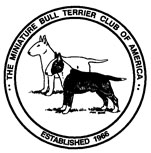|
MBTCA HEALTH
COMMITTEE REPORT: May 2001
There is not much to add to the
report of January 5. 2000. Dr. Johnson submitted his final report to the AKC
Canine Health Foundation. Unfortunately, his researchers were not able to
connect lens luxation in Minis with the Fibrillin 1 gene known to cause lens
luxation in humans. Neither could he rule out the possibility of a
connection. As mentioned previously, the DNA samples from our Minis are so
similar that there was no apparent difference between the samples from the
eight luxated dogs and the samples from the seventy whom had not yet luxated.
There were, however, some
positive outcomes from this study:
1. There are now at least 78
blood samples from Miniature Bull Terriers, labeled with identifying
numbers, frozen and stored for further research in Dr. Johnson's lab.
2. The location of the
fibrillin 1 gene appears to be on canine chromosome #30. This and other
information from the study was sent to Dr. Elaine Ostrander to help in the
development of the canine genome map at her lab in the Fred Hutchinson
Cancer Research Lab in Seattle.
3. The lens luxation research
has led to the proposal for a new study on Lens Luxation and Glaucoma as
described in the last report. The addition of six or more breeds in the
new study will help spread the cost of the reaction our club cannot afford
to "go it alone!"
4. Keep sending those blood
samples to Dr. Johnson's lab! A total of 78 dogs is good to have, but
there must be hundreds whose blood samples have not yet been sent in!
Dr. Eggleston from the
University of California at Davis has not, as yet, asked for additional DNA
samples. I will contact her and find out when she will need them. She
planned to start with the material from the cheek swabs some of us sent
several years ago, but she will need more.
Dr. Eggleston's project will add
more detail to the canine genome map. Although much has been learned, there
is still a tremendous amount of detail that needs to be added. If I can make
an analogy to a printed page, the present level of understanding is
something like being able to read all of the capital letters and some of the
small letters. But many or most of the small ones still can't be read. In
our Minis, it seems that all of the "capitals" and the readable "smalls" are
the same! We KNOW that there are differences in Mini DNA, so the researchers
have to keep trying to refine the map so that the presently unreadable genes
become readable. THEN they will be able to discern the presence of the
abnormal genes that result in lens luxation, kidney disease, heart problems
and other hereditary dog ailments.
MEANWHILE, breeders must not
breed from untested breeding stock. We can assume that each Mini is carrying
at least one (and probably more) genes for genetic problems. Breeders an at
least do their best to avoid doubling up on the same problem(s). If breeders
do not test or do not ask for test results from the prospective mate, think
twice about the breeding. Helping our Minis survive as a healthy breed
should be the MAJOR REASON for breeding a litter. If you have a nice Mini,
sound both structurally and mentally, by all means breed it. BUT, be honest
with other breeders about problem pups produced. Only by trying to help each
other, can breeders begin to see a drop in the number of affected puppies
with any of the genetically produced problems.
The Health Committee is in the
process of designing a questionnaire to determine the major health problems
the breed. Problems seem to be appearing that were not often mentioned just
a few years ago. Kidney problems, skin diseases and "spinning" are three
that are now being seen more frequently. The new questionnaire will be much
shorter and simpler than the last, which was the one sent to each breed club
by the AKCCHF.
The Health Committee would like
to be able to contact as many Mini Bull owners as possible since the greater
the response, the more valid the results. Most Mini Bull owners do not
belong to the MBTCA and do not read this newsletter. It would be VERY
helpful if those of you reading this would send the names and addresses of
anyone you know with a Mini, who is not on the latest club membership list,
to:
Lisa Bowers-Byrd
10074 CR #357
Terrell, TX 75161 or E-mail to
hsbyrd@connect.net
Thanks for your help!

|
